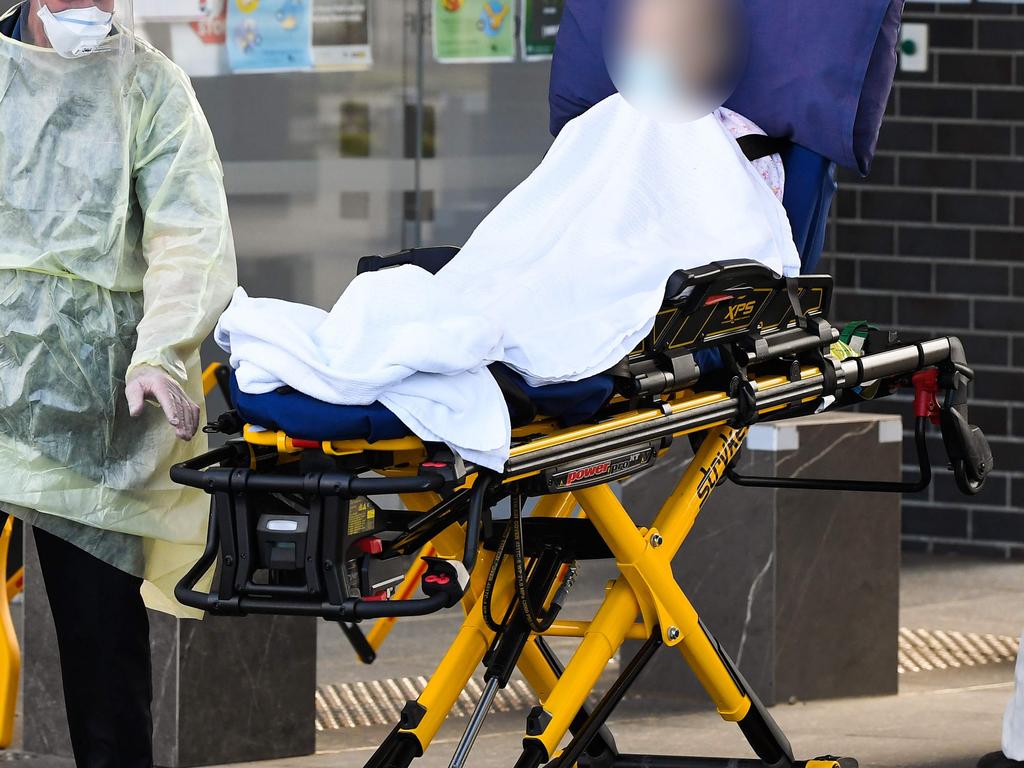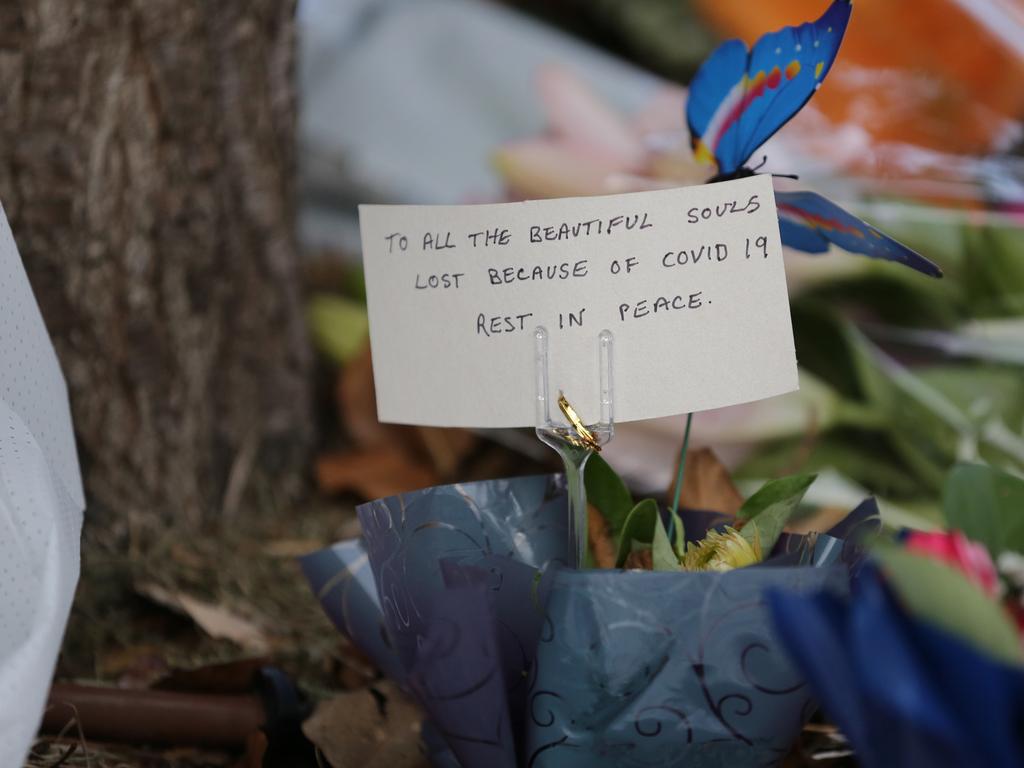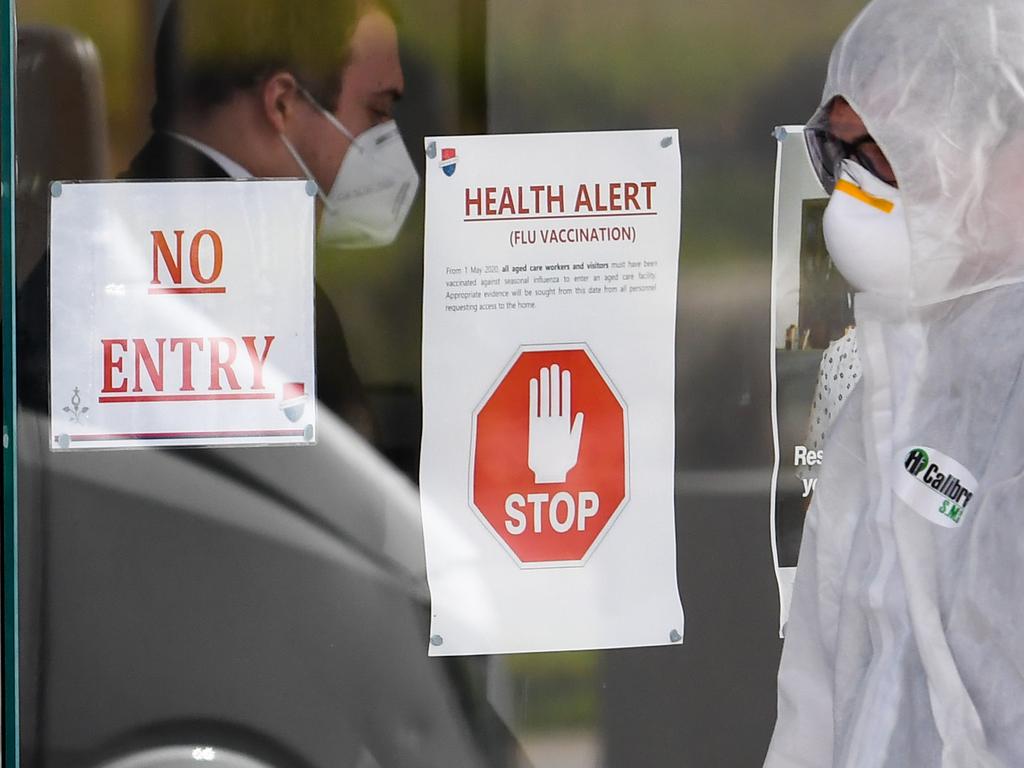Royal Commission: Aged care coronavirus deaths ‘hardly surprising’
Nearly 70 per cent of Australia’s virus deaths have been in aged care, as the royal commission heard why the figure is “hardly surprising”.
Australia’s coronavirus death rate in aged care is one of the highest in the world but the tragic loss of more than 200 lives is “hardly surprising”, a royal commission investigating the outbreak in the sector has heard.
Counsel assisting Peter Rozen, QC, delivered a scathing assessment of the sector’s readiness, telling the commission “we should not be surprised” that residential aged care has been the site of such tragic scenes.
“It’s not a system that is failing,” he said. “It’s a system operating as it is designed to operate.”

As of Monday, 203 coronavirus deaths in Australia have come from the aged care system.
Mr Rozen said 68 per cent of all deaths from COVID-19 in Australia came from residential aged care: “one of the highest rates in the world.”
“(These were) grandparents, parents, siblings and friends – a human tragedy,” he said.
Mr Rozen praised aged care workers for their “commitment, courage, dedication, and most of all, love” in “unimaginable” circumstances, and said the federal government should thank them with more than just words.
“Talk is cheap,” he said.
HOSPITALS REFUSE ADMISSION TO COVID-POSITIVE AGED CARE RESIDENTS
The commission also heard that the NSW health department asked that COVID-positive residents at Newmarch House – the site of 17 coronavirus deaths – not be transferred to hospitals because it didn’t want to “set a precedent”.
Mr Rozen said there had been problems in co-ordination between hospitals, which are run by state governments, and aged care, which is run by the federal government.
Public hospitals are legally allowed to refuse admitting and treating aged care residents.
Mr Rozen pointed to an email sent by NSW Health, which told the federal government it had a “preference” to not take COVID-positive residents from Newmarch House – which went on to record 37 positive cases and 17 deaths by the time the outbreak was brought under control.
NSW Health said this was because it did not want to “set a precedent”, he said.
Mr Rozen said he would question NSW Health further on what it meant by this during the commission hearings.
Anglicare, who runs Newmarch House, had “little to no say” in whether or not COVID-positive residents would be transferred to hospital, Mr Rozen said.
Instead, it was a conversation between the NSW and federal governments.
It was decided the Newmarch House would take a “hospital in the home” approach, with only two COVID-positive residents being transferred to hospital, and the rest remaining in the facility.
Newmarch House was the second outbreak in an aged care facility in NSW, after Dorothy Henderson Lodge which is owned by BaptistCare.
Dorothy Henderson Lodge contained to outbreak to 16 positive cases, a “quite successful” result, Mr Rozen said.
Manager responsible for the facility Melanie Dicks said they were “absolutely” assisted by the fact that they were able to transfer almost all of their COVID-positive residents to hospital.

Mr Rozen said aged care residents had a right to hospital treatment.
“Older people are not less deserving of hospital treatment because they are old,” he said.
Mary-Louise McLaws, Professor of Epidemiology, Healthcare Infection and Infectious Diseases Control with UNSW and Adviser to the WHO on COVID-19 preparedness, added that “negative residents have a right to remain negative”.
She said it was “very difficult” to stop the virus from spreading once a positive case had been identified within a residential aged care facility.
Nicola Spurrier, South Australia’s chief public health officer, also said families were more likely to be able to be with their loved ones as they died if they were in a hospital.
NO COVID-19 PLAN FOR AGED CARE
Mr Rozen told the commission there was no national co-ordinated plan for how to deal with COVID-19 in aged care from the federal government – which is responsible for aged care.
“How well prepared is the Australian aged care sector for COVID-19?” he asked.
“On July 29 2020, as COVID-19 was raging through a large number of nursing homes in Melbourne with devastating consequences, commonwealth Health Minister Greg Hunt was quoted as saying that, and I quote, ‘aged care around the country has been immensely prepared’.
“In a number of important respects, the evidence will demonstrate that the sector has been underprepared.
“While there was undoubtedly a great deal done to prepare the Australian health sector more generally for the pandemic, the evidence will reveal that neither the commonwealth Department of Health nor the aged care regulator developed a COVID-19 plan specifically for the aged care sector.”
He said a regulator was set up in July last year to keep the sector in line – but its preparation, after the coronavirus was first identified in Australia in March, largely consisted of sending out a survey that providers filled out themselves.
And 99.5 per cent of providers assessed their readiness for the coronavirus as satisfactory, with 42.7 rating themselves as “best practice” – including Newmarch House, where 17 residents died from an outbreak.
Mr Rozen questioned the effectiveness of the regulator, called the Aged Care Quality and Safety Commission, in any instance despite its 472 staff.
That was because aged care providers were legally allowed to refuse to let the regulator onto the premises, and they were also allowed to refuse to answer questions without giving a reason, he said.
The commission heard many aged care providers did not have a designated infection control manager on-site, despite outbreaks of other illnesses like the flu and gastro being a relatively frequent occurrence.
This is despite a Victorian coroner – Jennifer Coates, who is also running the inquiry into Victoria’s botched hotel quarantine – recommending exactly that in 2012 after an investigation into an outbreak of disease in an aged care facility.
‘I’D RATHER BE DEAD’
A resident in a Glen Waverley facility in Melbourne told the commission on Monday she would “rather be dead” than in aged care.

Merle Mitchell has been in residential aged care since 2016 and had previously given evidence to the royal commission.
She said when she expressed that view to staff she would be told off – “but they’re my thoughts, and I own my thoughts”, she said.
There have not been any cases of coronavirus at Mrs Mitchell’s aged care facility.
But the impact of lockdown and visitor restrictions have still had a serious toll on residents there, she said.

During lockdown, she has had no choice but to remain in her room 24 hours a day with one window that looks onto a brick wall.
The only exception is for four one hour-long appointments each week where she is allowed to see her physiotherapist.
If residents leaves the facility to go to the doctor, they are put into isolation for two weeks upon their return.
Isolation consists of an even smaller room with no window, where the only human interaction occurs when staff members drop off food.
For that reason, Mrs Mitchell has voluntarily missed several “fairly essential” appointments, and said other residents were making the same choice.
“I understand why we’re in this situation and that we’ve got to put up with it until things change,” she said.
“(But) I’m a people person – I like to see people as they are, not through the phone.”
Mr Rozen said that visitor restrictions had also had an impact on the quality of care within aged care facilities.
Family members and friends “help with feeding and other care needs” because of staffing issues at many homes, he said.
QUESTIONS ON MASK USE, COMMUNICATION
Mr Rozen said masks were only made compulsory in aged care in Victoria on July 13.
He added that aged care providers had problems sourcing adequate PPE, including masks, throughout the pandemic, with Newmarch House in particular finding sourcing PPE “incredibly difficult”, he said.
He also said it was “unforgivable” that families in Victoria were unable to find out if their loved ones in residential aged care were even alive.
The nation had watched families “camped outside” Newmarch House during its outbreak, desperate to find out any information they could.
The aged care sector should have learned lessons from that experience in order to prevent the same thing happening again – but Mr Rozen the same communication issues had appeared again in Victoria.
ONGOING INQUIRY
The Royal Commission into Aged Care Quality and Safety has been investigating the troubled sector since September 2018, but added extra hearings to look specifically at its response to COVID-19 following devastating outbreaks in Sydney.
Commissioner Tony Pagone, QC, said the effect or coronavirus on aged care since then in Melbourne had been “tragic in ways that were unimagined a few weeks ago” with the full impact still unknown as the virus continues to rip through aged care homes.
“There are many questions we will not be able to answer,” he said.
The hearing continues.



